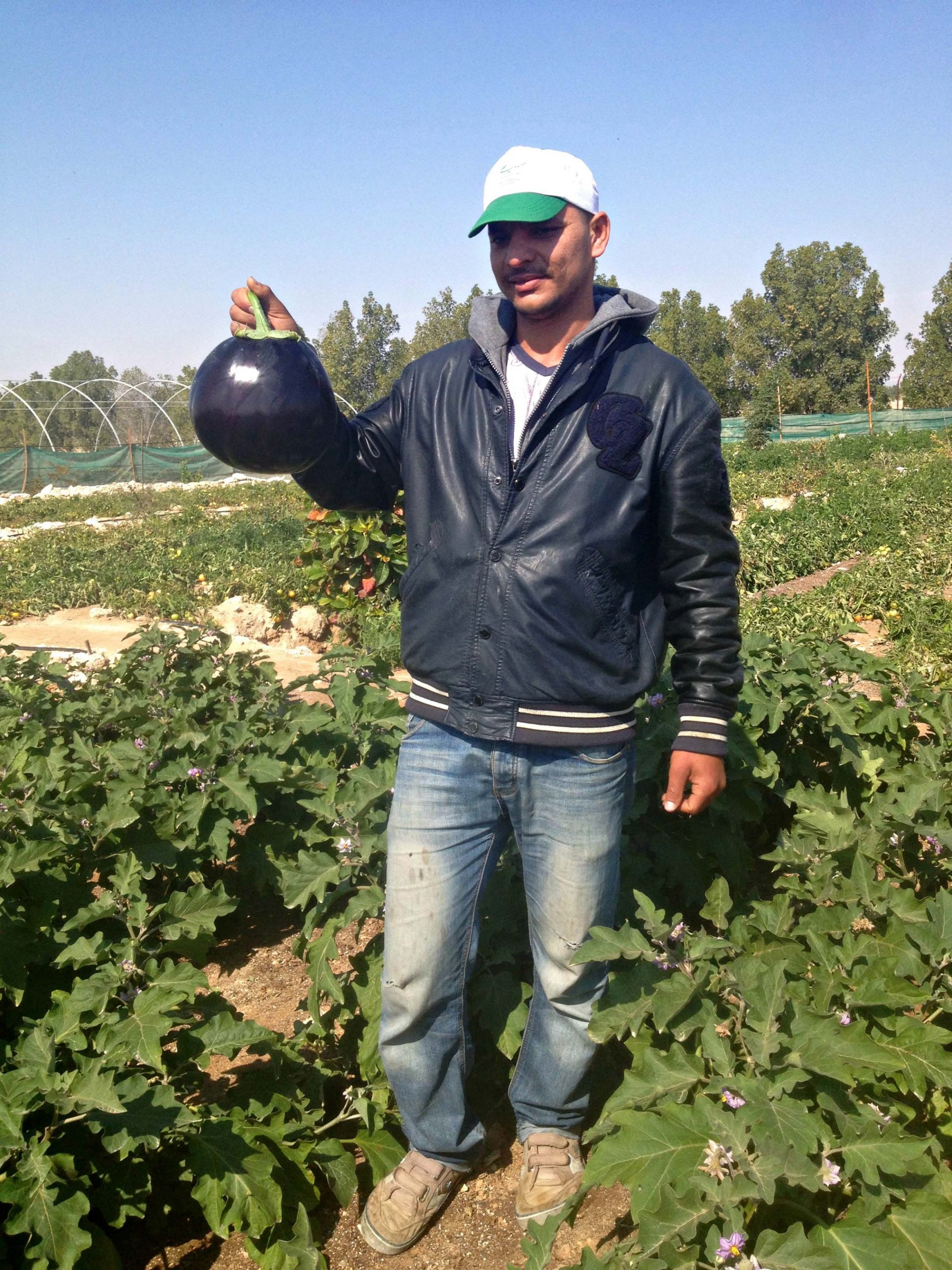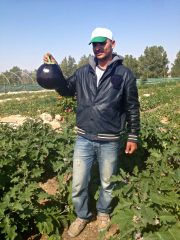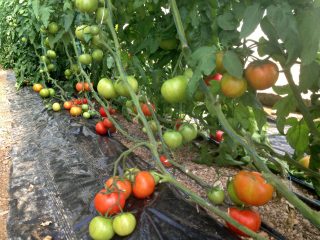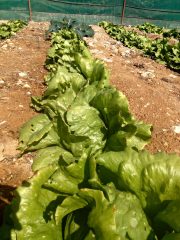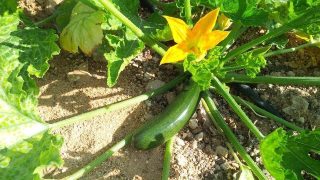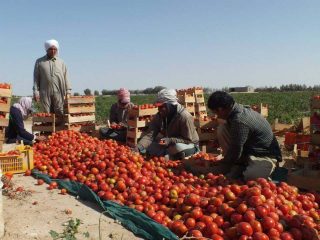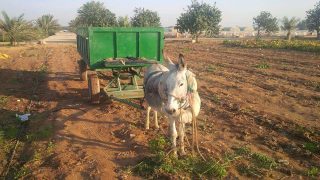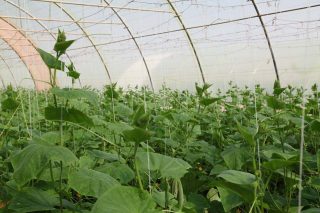Photos by Guillaume Dimanche and Lesley Walker
The only farm in Qatar to grow internationally-certified organic vegetables is expanding, making more of its produce available in shops and restaurants across the city, as well as at local markets and through household boxes.
The farm’s growth comes as improving Qatar’s food security, eating more healthfully and reducing food miles appear to be growing more important to residents here.
Al Safwa farm, which is about a 20 minute-drive from Umm Salal Ali, north of Doha, has been in operation for nearly 50 years, mostly as a traditional, small-scale farm that provided fresh produce for family and friends of its owners.

Now run by Nasser Ali bin Khamis al Kuwari and his family, along with French-Tunisian expat Olfa Guetata, the private, 660-acre farm is working toward becoming entirely organic by 2018.
Al Kuwari began growing organic produce in 2011, first selecting a section of the farm to test out whether it could grow vegetables in a properly organic way.
After years of meticulously reorganizing the facilities, removing all traces of pesticides from the soil and experimenting with different types of vegetables, the trial was deemed a success. The farm achieved certified status from the International Federation of Organic Agriculture Movement in 2014.
At first, only a few of the farm’s vegetables were officially organic, such as cucumber, eggplant, tomato and zucchini.
However, the part of the farm devoted to organic produce has since expanded to include broccoli, green beans, cauliflower, pumpkin, white and red cabbage, a second variety of eggplant and four different types of tomato.

Meanwhile, in the organic nursery, members of farm’s 50-strong team are currently undertaking a trial to see if they can also grow yellow zucchini, white beans and what would be the farm’s first fruit, charentais melon, using seeds imported from France, Italy and the Netherlands.
If successful, the items will be added to the farm’s regular range of produce, Guetata told Doha News during a tour of the site this week.
Currently, around 40 percent of the farm is dedicated to organic growing, mostly outdoors, but also using six large greenhouses to protect some of the more delicate crops from the harsh climate.
A further 10 percent of the land is currently lying dormant, waiting for the soil to become pure so it can eventually be use to grow organic produce. The remaining half of the farm is semi-organic, using only “natural” pesticides.
Each year, the amount of pesticides deployed in this section is being decreased so that, in three years’ time, the entire farm will be organic-only, Guetata added.
Growing
Looking around the farm, one could observe eggplants the size of footballs, and tomatoes that smell sweet and very fresh.
The yield also appears plentiful. During the main growing period during the cooler months between December and May, the farm nets 100kg of each variety of vegetable every day, Guetata said.
Much of the produce goes directly to hotels and shops in Qatar, to satisfy a growing appetite in the country for organic, local produce with minimum food miles.
In particular, chefs here have been keen to use the farm’s vegetables, Guetata said. The farm currently supplies ingredients to the Diplomatic Club, Italian restaurant La Spiga by Papermoon restaurant at the W Hotel and the Crowne Plaza Hotel.
Guy Savoy, who ran the now-closed eponymous restaurant on the Pearl-Qatar, was one of the farm’s first chef customers. Farmers there have also advised Qatar Foundation and helped set up an organic kitchen garden that provides food for one of the canteens in Education City.

Meanwhile, in October last year, Guetata met with managers at French supermarket Monoprix and persuaded them to sell some of the farm’s vegetables in the store.
So far, customers appear to be happy with the produce’s prices and freshness, she told Doha News, continuing:
“I saw they had imported organic vegetables, but they worked out to QR150 or 30 Euros a kilo. No one is going to pay that sort of money for tomatoes.
So I spoke to the manager and told him we could start supplying them with local vegetables. Our organic tomatoes sell there for QR37 a kilo, which is much more reasonable. People are trying them, realizing how much better they are, and buying them again.”
The vegetables are picked off the plants daily at 5am, packaged up and then driven directly to the supermarket, ready to go out on the shelves just a few hours later.
While some of the produce is also sold at Al Mazrouah farmers’ market at the weekends, Guetata has also just began a household box system.
The vegetables come in 3kg and 6kg options, for organic and also semi-organic mixed, seasonal produce, as well as the option to order just boxes of tomatoes.
Customers can contact the farm via its Facebook page and place an order each Wednesday by 5pm. The vegetables are picked and the boxes made up the following day, and can then be collected from a central Doha location at a pre-agreed time on Friday.

Elsewhere in Qatar, some residents turn to the wholesale market in Abu Hamour as a favored location for a wide range of affordable vegetables. But the vendors there often complain that sales are affected by the weather, with low turnout in the cooler months forcing them to cut prices.
Meanwhile, as the number of large supermarkets in Qatar increases, they are also becoming a more popular place for residents to buy their produce.
Growing more food
As a desert country with very little in the way of an agricultural heritage, Qatar is heavily reliant on importing almost all of its food to meet the requirements of a rapidly increasing population.
Food security is one of the key aspects of the 2030 National Vision, and while authorities continue to enter into deals with other countries to up resources, they are also increasingly looking at how to boost domestic food production to meet a target of growing 40 percent of its own food by 2024.

Initiatives like the farmers’ markets at Al Mazrouah, Al Khor and the recently-launched Al Wakrah have started to raise awareness in society about the benefits of relatively affordable local produce.
They are becoming increasingly popular, not only among Qataris but also expats, many of whom are used to similar experiences in their home countries.
When the farm first started to grow organically, Guetata said there was great skepticism among other farmers and society in general about the move.
“Everyone said it wouldn’t work. That the climate in Qatar was too extreme. We proved them wrong, and now we are expanding.”
By spreading the word of their success, hopefully more farmers here will be encouraged to make the move, she added.
Would you buy organic produce? Thoughts?

